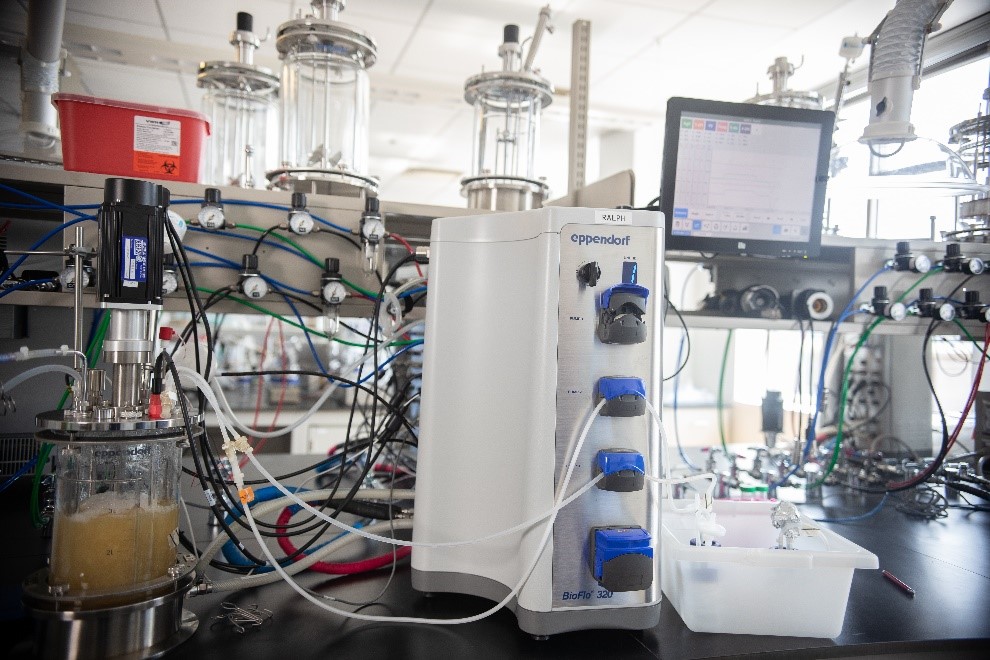Capital Region Contract Drug MFGs Ramp up Small Batch Capabilities

BioDevelopment, Kinentia Biosciences and Curia Global have operations at UAlbany’s Health Sciences Campus in ast Greenbush
Contract manufacturing operations in the Capital Region’s Life-Sciences Cluster have been expanding their abilities to produce kilogram-scale batches of small molecules and active pharmaceutical ingredients (APIs) in facilities that are compliant with good manufacturing practices (GMP).
At the University of Albany’s Health Sciences Campus in East Greenbush, two biotech firms have recently expanded their GMP capabilities. Last year, BioDevelopment Inc. (BDI) officially opened a kilo GMP facility at 9 University Pl., across the street from Regeneron Pharmaceuticals main campus in East Greenbush. While this project started in 2021, it took BDI more than two years to get the equipment for the 10,000-square-foot facility’s seven small kilo-scale manufacturing suites.
BDI’s Rensselaer facility supports small-batch production ranging from 1 to 15 kg, whereas the smallest batches that BDI’s parent company, BioSpectra, can produce at 150 kg at its Bangor, Pennsylvania facility. The East Greenbush kilo-scale, small molecule synthetic and purification suites support the development and manufacture of small volume API’s and other critical small molecules. BioSpecta describes the Rensselaer facility as being “part of our overall API Manufacturing Platform,” but only its Bangor, Pennsylvania plant is registered with the FDA as an API manufacturer.
Kinentia BioSciences also completed construction on a new current GMP suite at 7 University Pl., and it recently registered that establishment as an API manufacturer with the U.S. Food and Drug Administration. In 2023, TAE Life Sciences announced that Kinentia would exclusively manufacture at its GMP facility a boronated TC220 drug for boron neutron capture therapy. And last August, Adora Life Sciences announced that Kinentia had assisted it in obtaining its first patent relating to processes to prepare a purified form of the active ingredient in the startup’s injectable veterinary generic polysulfated glycosaminoglycan (PSGAG).
Adora’s CEO is Thomas D’Ambra, who in 1991 co-founded Curia (then Albany Molecular Research Inc.). D’Ambra is also the CEO of Pharmapotheca A, a Delmar drug research firm that invents, develops and commercializes pharmaceutical technologies and treatments for attention deficit hyperactivity disorders (ADHD). Pharmapotheca A’s web site identifies Kinentia as a contact for laboratory samples of its patented dialkyl (or diaryl)(2-alkylaziridin-1-yl)phosphoramidate compounds.
These developments at the Health Sciences Campus followed several investments that Curia Global made at its Chemical Development Hub in Albany. In 2021, Curia announced the addition of new suites designed to manufacture 10-15 kg batches. A year later, Curia added two new GMP suites to support scale-up speeds. That investment brought Albany facility’s total number of GMP-compliant suites to 10 and tripled its 200-L capacity. The expansion positioned Curia’s Albany hub to simultaneously conduct 10 more clinical trials per year. This expansion enabled Curia to supply from one facility start-to-finish molecules with batch sizes less than 20 kg. The Albany Chemical Development Hub could also simultaneously handle 10 production runs and support 10 more clinical trials each year.
Around the same time that Curia completed this expansion, PharmD students at the Albany College of Pharmacy and Health Sciences and contract research scientists at the Stack Family Center for Biopharmaceutical Education and Training (CBET) began producing alpha-synuclein, a neurodegenerative protein associated with Alzheimer’s disease pathology of a protein associated with Alzheimer’s disease pathology. However, this high-purity material is manufactured at lower volumes (mg).
CEG INITIATIVES
CEG is supporting the growth of the region’s life sciences cluster by leading the following initiatives:
Marketing the Capital Region’s life sciences R&D assets at talent pipeline.
Improving businesses’ access to labs at facilities, such as those at the University at Albany, NY Creates’ Albany Nanotech Complex, Rensselaer Polytechnic Institute and others affiliated with Innovate 518, a University at Albany-led collaborative effort of Capital Region incubators, accelerators, and entrepreneurial service providers.
Helping biotech firms, such as Vital Vio and Precision Valve & Automation grow through its Manufacturing Solutions services, including continuous improvement, technology acceleration, energy and sustainability, supply chain development and workforce initiatives.
Don’t miss these insights into the trends that are shaping the Capital Region’s economy. Sign up for CEG’s e-news and follow us on:














